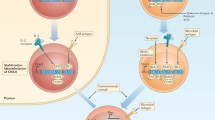Abstract
The mechanisms concerning how the immune system is able to deal with the massive antigen challenge represented by the commensal bacterial flora have been a mystery. Recently a number of animal models with impairment of these mechanisms have been identified. One of these is the C3H/HeJBir mouse, which, under certain environmental conditions, can spontaneously develop colitis, which later remits. These mice show increased B cell and T cell reactivity to antigens of the enteric bacterial flora. CD4+ T cells from this strain cause colitis, when activated by enteric bacterial antigens and transferred to histocompatible severe combined immunodeficiency recipients. This colitis is mediated by CD4+ Th1 cells and requires a sustained mucosal production of interleukin-12, which, in turn, is dependent on CD40L-CD40 interactions in the gut. Regulatory T cells that appear to limit the colitis have been identified and have the properties of the T-regulatory-1 subset. Functional Tr1 activity for bacterial antigens is present in the lamina propria CD4+ T cells. These Tr1 cells may exert their effects by inhibition of dendritic cell function in the mucosa, rather than by direct effects on Th1 cells. Many questions remain to be answered, including, How do the enteric bacterial-host interactions shape the immune system for abnormal responses such as inflammatory bowel disease, autoimmunity, and allergy?
Similar content being viewed by others
References
Crabbe PA, Bazin H, Eyssen H, Heremans JF: The normal microbial flora as a major stimulus for proliferation of plasma cells synthesizing IgA in the gut: the germfree intestinal tract. Int Arch Allergy 1968;34:362–375.
Hooper LV, Wong MH, Thelin A, Hansson L, Falk PG, Gordon JI: Molecular analysis of commensal host-microbial relationships in the intestine. Science 2001; 291;(5505):881–884.
Duchmann R, Schmitt E, Knolle P, Meyerzum Buschenfelde KH, Neurath M: Tolerance towards resident intestinal flora in mice is abrogated in experimental colitis and restored by treatment with interleukin-10 or antibodies to interleukin-12. Eur J Immunol 1996;26(4):934–938.
Duchmann R, Kaiser I, Hermann E, Mayet W, Ewe K, Meyerzum Buschenfelde KH: Tolerance exists towards resident intestinal flora but is broken in active inflammatory bowel disease (IBD). Clin Exp Immunol 1995;102(3):448–455.
Elson CO: Experimental models of intestinal inflammation: new insights into mechanisms of mucosal homeostasis; in Ogra PL, Mestecky J, Lamm ME, Strober W, McGhee JR, Bienenstock J (eds): Handbook of Mucosal Immunology. San Diego, Academic, 1999, pp. 1007–1024.
Sundberg JP, Elson CO, Bedigian H, Birkenmeier EH: Spontaneous, heritable colitis in a new substrain of C3H/HeJ mice. Gastroenterology 1994;107(6):1726–1735.
McCabe RP, Sharmanov A, Birkenmeier E, Sundberg J, Elson CO: Mucosal immune abnormalities in C3:H/HeJBir mice with susceptibility to colitis. Gastroenterology 1994;106:A731.
Brandwein SL, McCabe RP, Cong Y, et al: Spontaneously colitic C3H/HeJBir mice demonstrate selective antibody reactivity to antigens of the enteric bacterial flora. J Immunol 1997;159(1):44–52.
Cong Y, Brandwein SL, McCabe RP, et al: CD4+T cells reactive to enteric bacterial antigens in spontaneously colitic C3H/HeJB ir mice: increased T helper cell type 1 response and ability to transfer disease. J Exp Med 1998;187(6): 855–864.
Cong Y, Weaver CT, Lazenby A, Elson CO: Colitis induced by enteric bacterial antigen-specific CD4+ T cells requires CD40-CD40 ligand interactions for a sustained increase in mucosal 1L-12. J Immunol 2000;165(4): 2173–2182.
Powrie F, Leach MW, Mauze S, Caddle LB, Coffman RL: Phenotypically distinct subsets of CD4+ T cells induce or protect from chronic intestinal inflammation in C. B-17 scid mice. Int Immunol 1993;5(11):1461–1471.
Bacchetta R, Bigler M, Touraine JL, et al: High levels of interleukin 10 production in vivo are associated with tolerance in SCID patients transplanted with HLA mismatched hematopoletic stein cells. J Exp Med 1994;179(2): 493–502.
Groux H, O'Garra A, Bigler M, et al.: A CD4+T cell subset inhibits antigen-specific T-cell responses and prevents colitis. Nature 1997; 389:737–742.
Cong Y, Weaver CT, Lazenby AS, Sundberg JP, Elson CO: T-regulatory-1 (Trl) cells prevent collitis induced by enteric bacterial antigen-reactive pathogenic Th1 cells. Gastroenterology 2000; 118:A3755.
Cong Y, Saparov A, Weaver CT, Elson CO: Enteric bacterial antigen-specific T-regulatory-1 (Trl) cells are present in the murine intestinal lamina propria. Gastroenterology 2000;118:A1903.
Cong Y, Weaver CT, Lazenby A, Elson CO: T-regulatory-1 (Trl) cells that prevent CD4+T cell colitis inhibit the antigen-presenting function and IL-12 production of dendritic cells. Gastroenterology 2001;120:A38.
Kalliomaki M, Salminen S, Arvilommi H, Kero P, Koskinen P, Isolauri E: Probiotics in primary prevention of atopic disease: a randomized placebo-controlled trial. Lancet 2001;357:1076–1079.




